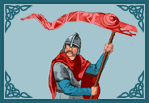 |
 |
|||
|
|
Bran was the son, probably the eldest, of King
Dumnagual Moilmut and would have succeeded him in the early
6th century. Bran the Old, apparently lived to a great age but,
despite this, nothing is known for certain about him.
It is quite probable, however, that some elements of
his life-story have entered into the tale of Belinus & Brennius as
told by Geoffrey of Monmouth.
This story is an amalgam of various anecdotes concerning several men of
similar names, mistakenly or otherwise, merged into a single character.
Though transported back to a mythical period around 450 bc, Brennius
is clearly named as the son of Dumnagual Moilmut and King of Northumberland
(otherwise described as the land north of the Humber to Caithness). The
two brothers, central to the story, can, however, also be clearly identified
as the gods, Beli &
Bran, who appear elsewhere in Celtic myth. The fighting brothers
is a popular theme throughout World mythology, but it may be that the details
have been influenced by events from the life of the historical Bran Hen. The
story goes something like this: Upon the death of their father, the brothers, Belinus and Brennius, inherited the Kingdom of Britain. There was some disagreement about the division but eventually Brennius took the lands north of the Humber and Belinus the rest. However, while the former was abroad marrying the daughter of the King of Norway, Belinus invaded his kingdom. Brennius tried to return but, through a number of misadventures, lost both his army and his wife. He eventually ended up in Burgundy where he married the monarch's daughter and inherited that kingdom. With a vast army, he invaded Britain but, through the intercession of his mother, was eventually reconciled with his brother. A later episode involving the conquest of Rome is based on the historical Gaulish leader called Brennus. Chrétien de Troyes places Bran Hen in his correct chronological context when he refers to Kings Belin & Brien in his Arthurian romance, Erec & Enid. This almost certainly identifies him with the the evil literary knight, Sir Brian of the Isle, who was also banished from his Northumbrian kingdom, this time by Sir Lancelot. The historical Bran was succeeded by either his brother, Cuncar, or his nephew, Morcant Bulc. Records of King Bran date back to the 10th century. He is generally considered legendary.
|
|||
| © Nash Ford Publishing 2001. All Rights Reserved. | ||||




